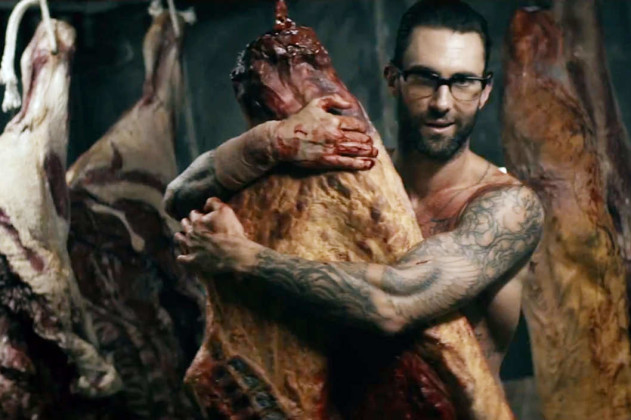Maroon 5’s latest music video is yet another media representation of how our culture normalizes violence against women.
Adam Levine—the Maroon 5 front man who garnered headlines in May 2012 for his declaration that he was “promiscuous” because he “loved women so much”—has come under fire for his latest work of misogyny, the music video for his band’s single, “Animals.”
If the sound of another Maroon 5 song isn’t bad enough, then the sight of Adam Levine playing the role of a deranged butcher—blood-soaked and swinging around carcasses in a meat locker—should disturb you.
But the video does not end there. Consistent with the song’s lyrics, which include such gems as “Baby I’m preying on you tonight/hunt you down eat you alive/Just like animals,” the video’s plot centers on the butcher, stalking and capturing his prey. Levine’s victim—a customer, played by the musician’s new wife, model Behati Prinsloo—was nauseating. But depiction of Levine and Prinsloo writhing around in a bed, covered in blood, conjured the worst forms of sexual violence—a fact of life for an untold number of women and girls across this planet.
This from Adam Levine, who loved women so much.
Behati Prinsloo is a grown woman—I can hear the naysayers already—she chose to act in this video, so who are we to judge?
Now, I do not critique this video a means to cast aspersions upon Prinsloo. I have no horse in that race. My critique does not center on questions of Prinsloo’s agency, volition, or ability to make her own decisions.
Nor am I suggesting that Adam Levine is engaging in violence against his wife, beyond whatever psychic and emotional violence the request that she play the target of his stalking and sexual assault for entertainment might inflict. But the fact is, this newlywed created a music video in which his beloved wife is treated as a piece of meat, a body to slash, a victim of sexualized violence—all at his hand.
This from Adam Levine, who loved women so much.
It’s just a music video, supporters might argue, there is no reason to be so sensitive. To dismiss critiques of this music video as mere “art” and to minimize its critics as overwrought handwringers who have nothing better to do than complain about an artifact of pop culture is to miss the point.
Contrary to the intent of its producers, this video should not be seen as edgy, cool, or sexually enticing. What media representations like this do is normalize the epidemic of violence against women. That, in turn, contributes to the epidemic. It is very simple.
Now, I don’t fault Adam Levine for endeavoring to stay relevant; this is the work of any lead singer in a middlebrow rock band that long ago aged past its prime. But the desire to extend relevancy for another 15 minutes does not excuse his involvement in this production, which is utterly misogynistic in its themes, lyrics, and visual content.
Levine did not do it alone. And there’s an argument to be made that to the extent he was involved in the video’s development, and the writing of this song itself, he was satisfying the demands of his fans, and the broader culture, of which he is an indelible part.
But there is no excuse. The fact that the forces of capitalism, the expectations of the market come down to bear on any recording artist does nothing to exculpate Levine from his own misdeeds.
If anything, the fact that this video was made at all reflects the reality that to be a woman in this culture is to be at risk—of ongoing objectification, of the substitution of sexuality for humanity, of normalized sexual and gender-based violence.
I don’t have to tell you the statistics to tell you that domestic violence is an epidemic in the United States, but let’s brush up, for the sake of clarity. Domestic violence is a crisis in the U.S., where 1 in 12 women have been stalked; 1 in 6 sexually assaulted; and 1 in 3 will experience domestic violence in her lifetime.
If Levine “loved women so much,” as he’s claimed, perhaps he’d think about these facts. He’d acknowledge the effect of “Animals,” on normalizing sexual violence in our culture, and the impact this normalization has on people of all genders, including—and especially—on youth.
And he still can.
Levine could use the backlash as an opportunity for growth. He could join the ranks of fellow musician John Legend and countless other men who’ve aligned themselves with the #itsonus initiative to combat rape culture and speak up against sexual assault. He could use his tremendous media platform to acknowledge and denounce sexual violence in all forms, retracting his video and donating all proceeds from the record to an organization such as the Rape, Abuse, & Incest National Network (RAINN).
Both the song “Animals” and its music video are the product of an environment in which maltreatment of women is not only tolerated, but valorized; in which sexual violence is a source of entertainment, in which stalking and violating a woman is a revenue generator and a cultural fantasy. His articulated “love” for women notwithstanding, it’s clear that Adam Levine finds this acceptable. The onus is on us—all those who love women—to declare with the full strength of our conviction that it’s not.
Adina Giannelli’s writing has been featured in publications including Babble, Feministing, Salon and the forthcoming anthologies Book Lovers and Three Minus One Equals Zero.
Related Links:

